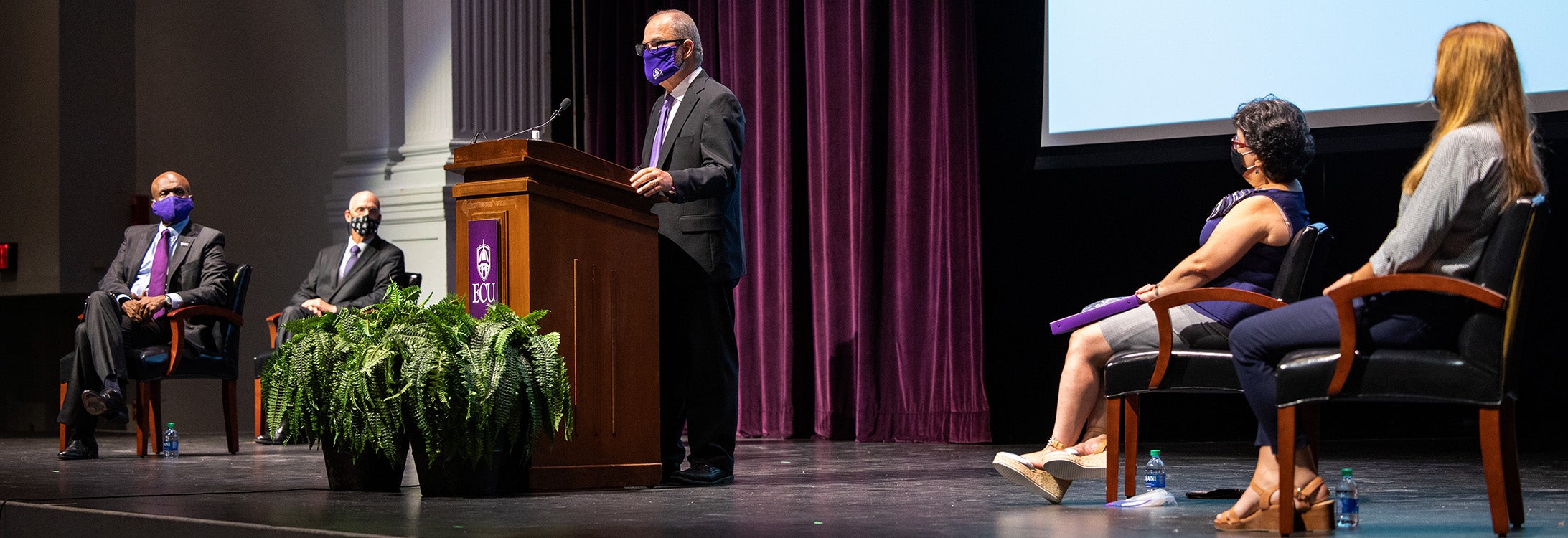MOVING FORWARD
Fall 2020 begins with new take on convocation
For the first time, East Carolina University’s faculty gathered for convocation virtually on Aug. 7 with a ceremony streamed from Wright Auditorium.
Dr. Joseph Lee provided a presentation on the coronavirus, inequities and research in eastern North Carolina, followed by perspectives on the upcoming school year by Dr. Ron Mitchelson, interim chancellor, and Dr. Purificación Martinez, chair of the ECU Faculty Senate.
The performance portion of the ceremony was a video provided by Ken Wyatt, associate professor of film and video production in the School of Art and Design, titled “Breakthroughs & Messages in a Bottle,” which highlighted topics covered in his work as a videographer.

Dr. Purificación Martinez, chair of the ECU Faculty Senate, gave her perspective on the coming semester and discussed the importance of the pursuit of knowledge and the role of higher education during her convocation address.
The slides on display as the meeting began recognized the past year’s nominees and winners of teaching, research and creative activity, and scholarship of engagement awards. Martinez began by acknowledging the efforts of the faculty, as well as the staff senate and student government, during the unusual circumstances of the spring and summer.
“In a blur spent redesigning courses, rethinking everything we do in labs and classes, and attending town halls and special faculty senate meetings, the summer is gone and the 2020 school year is beginning,” she said.
During past convocations, the recipients of top teaching and research awards have addressed the faculty. Lee’s presentation replaced those of Dr. Liza Wieland, professor of English and winner of the 2020 Lifetime Achievement for Research and Creative Activity Award, and Dr. Toby Allen, associate professor of chemistry and winner of the 2020 Excellence in Teaching Award presented by the UNC System Board of Governors. Martinez said both supported the change.
Lee is a behavioral scientist trained in public health whose work focuses on documenting, understanding and intervening on health inequities, particularly relating to tobacco use, LGBT health and farm worker health. He provided an overview of the public health community’s perspective on the COVID-19 pandemic and explained how it relates to and contributes to existing health inequities.
“After the initial outbreak,” he said, “modern plagues have the largest impact on those who are most vulnerable and have the fewest resources.”
For example, through agricultural exemptions for labor protections, migrant farm workers live in more crowded conditions that make it impossible to social distance, and their children are more likely to lack internet access for virtual schoolwork, Lee said.
He pointed out that there are ways for students and researchers in a variety of fields, beyond health care and biomedicine, to make a difference — from geographers and social workers to interior designers. “We are all involved in this, not just as participants but also as potential researchers,” he said.
Mitchelson welcomed ECU’s new faculty and staff members. “You are joining a university that is deeply committed to the success of our students and the region that we call home,” he said. “Regardless of the challenges that we face, this university is always true to its mission and our calling, which is to serve.”
The university community has a shared responsibility, he said, to adhere to the policies, procedures and guidelines that have been developed in response to the pandemic.
“Wearing a face covering, social distancing, avoiding large gatherings, good hand washing, monitoring symptoms, following cleaning protocols and adhering to quarantine and isolation orders are among the requirements that we all must follow to minimize our exposure to the virus and to permit us the opportunity to continue with in-person campus activities at ECU,” Mitchelson said.
Behind his mask, he was clearly moved by how ECU’s faculty and staff have responded to the challenge, adapted to teleworking and block scheduling, and developed and instituted new procedures.
“I am grateful for your excellence in the classroom,” he said. “I am grateful for your investments in advising and mentoring students. I am grateful for the cutting edge research and wonderful creative activities that our campus provides. I am grateful for the innovations in health care.
“I am grateful for our willingness to pursue solutions to the great challenges of our time. I am grateful for your service to this region. And I am very grateful for the support and patience that you have shown me over the last few months.”
Mitchelson also acknowledged the work that must be done at ECU to help overcome racism, hate and injustice.
“As always, ECU moves forward moving together,” he said. “We must and will do more to accept and celebrate the richness of our differences, educate and find truth, and push ourselves and others to action.”
Martinez expressed her confidence that ECU’s faculty would start Monday morning ready to teach, a mission she said is essential despite the trend of lack of support and decreased funding for higher education.
“ECU, in the top 15% of performers with respect to social mobility, has proven that a university can transform an entire region, one graduate at a time,” she said. “The entire UNC System is a testimony to that. What would North Carolina be without its public institutions of higher learning? Would the research triangle exist, the financial hub that is Charlotte?
“… If COVID-19 has taught us anything, it is the fact that a person cannot survive or succeed alone, and that investing in health, education and research is not a luxury but an everyday necessity.”
Martinez encouraged her colleagues to not only continue to disseminate and create knowledge, but also to stand together to defend the importance and value of that knowledge and the institutions dedicated to its pursuit.
“ECU has 2,073 faculty members,” she said. “Each one of you is needed.”
